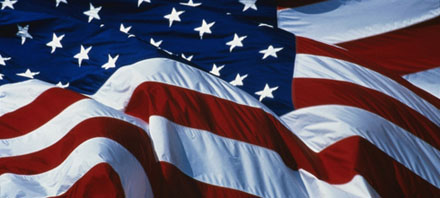
Band
A narrow strip of canvas along the edge of the flag that goes next to the staff. Sometimes called the “heading.”
Canton
The blue field in the upper left corner of the flag.
Color
In the military service, a national flag carried by unmounted units is called a “color.” The expression “the colors” is used generally in referring to the flag.
Dip
To dip the flag is to lower it at salute. Refers to a flag of an organization, state or city. The U.S. flag is never dipped.
Ensign
In the Navy, the national flag is usually spoken of as the “ensign.”
Finial
The object on the top of a flag pole – generally an arrow, ball or eagle.
Fly
The length of the flag.
Fringe or Gold
Gold braiding placed along the three edges of the flag away from the pole.
Grommet
The eyelet through which the halyard is fastened to the flag.
Half staff
To lower the flag some distance (not necessarily halfway down) from the top of the staff, as a sign of mourning.
Halyard
The rope used to raise the flag. Also called a hoist rope.
Hoist
The width of the flag. To hoist the flag is to raise it to the top of the staff.
Old Glory
Refers to the U.S. flag. This famous name may have been coined in 1831. Some friends presented Capt. William Driver with a 24-star flag. As the banner opened to the ocean breeze, he exclaimed, “Old Glory!”
Peak
The highest point to which a flag can be raised.
Point of Honor
On the U.S. flag, this is the blue field and stars (union).
Staff
Flag pole. On a ship it may be referred to as a mast.
Union
The blue background with white stars, symbolizing the union of the states.
